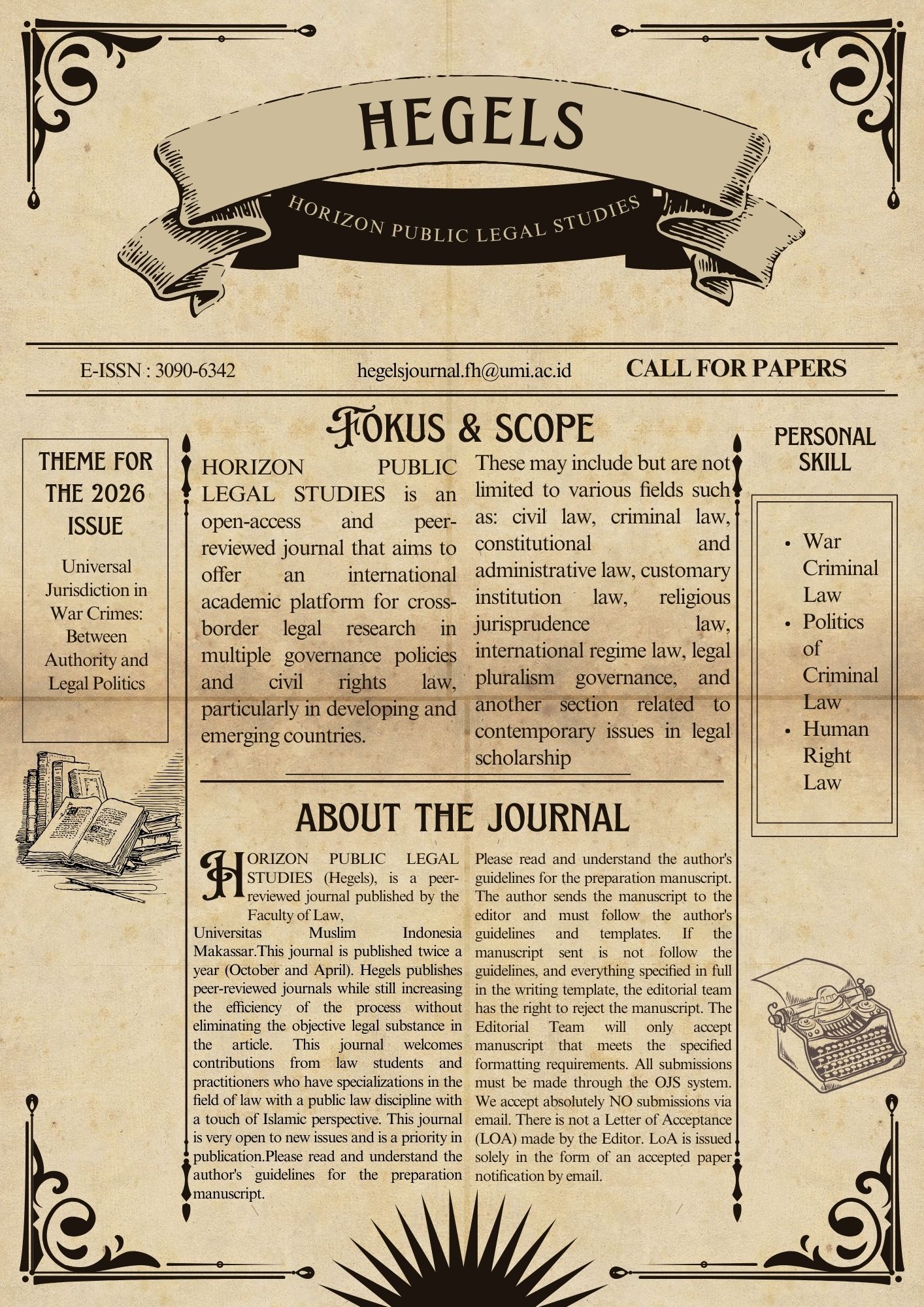Normative Analysis Of Electric Bike Use By Minors
DOI:
https://doi.org/10.56087/hegels.v2i1.1023Keywords:
Keywords: Legal Regulations, Electric Bicycles, Minors.Abstract
This study aims to determine the legal regulations for electric bicycle users for minors and to determine what sanctions affect the use of electric bicycles for minors. This study uses a normative legal research method with a statutory and conceptual approach. The data collected includes laws, government regulations, and related literature. The results of this study indicate that the Regulation of the Minister of Transportation Number 45 of 2020 concerning Certain Vehicles Using Electric Motor Drives, requires that the age of electric bicycle users is at least 12 (twelve) years, which means that children under the age of 12 (twelve) years cannot ride electric bicycles in special lanes, especially on highways. Legal sanctions for electric bicycle users are not mentioned, but legal sanctions for renters or rental service providers can be given administrative sanctions such as fines and revocation of business licenses if the rental service party violates the provisions on the age of electric bicycle users. As well as providing responsibility in the event of an accident or incident involving a minor using a rented electric bicycle. Addressed to the government to revise existing laws and regulations, such as Law Number 22 of 2009 concerning Traffic and Road Transportation to accommodate the development of electric bicycle technology and provide more specific legal regulations, as well as increase sanctions for electric bicycle users, parents, and electric bicycle renters so that accidents do not occur for other road users. And the importance of educating children that the use of electric bicycles must meet the requirements and comply with applicable laws.
References
[1] O. J. I. Fachruroji, “‘ TANTANGAN PENEGAKAN HUKUM DALAM PERKEMBANGAN TEKNOLOGI ,’” pp. 1–8.
[2] A. Aswari, “Perlindungan Hukum Tanpa Penegakan Hukum Dalam Sengketa Transaksi Elektronik,” Kertha Patrika, vol. 42, no. 2, p. 163, 2020, doi: 10.24843/kp.2020.v42.i02.p05.
[3] M. Hatta et al., “Internet and Terrorism in Indonesia,” J. Phys. Conf. Ser., vol. 1114, no. 1, 2018, doi: 10.1088/1742-6596/1114/1/012080.
[4] A. P. Buana, A. Aswari, M. F. Said, and M. Y. Arifin, “Responsibility Parking Service Business to The Protection Of Consumer Of The Parking Services in Makassar,” Subst. Justice Int. J. Law, vol. 1, no. 1, p. 23, 2018, doi: 10.33096/substantivejustice.v1i1.15.
[5] M. F. Ramadhan, “Legal Review of Action Criminal Exploitation of Street Children at Crossroads in the Name of Beggars,” vol. 1, no. 2, pp. 1–7, 2025.
[6] C. Libraty, “DEATH PENALTY IN THE PERSPECTIVE OF ISLAMIC LAW AND LAW NO . 39 OF 1999 CONCERNING HUMAN RIGHTS MAN,” vol. 1, no. 1, pp. 1–5, 2025.
[7] F. S. Rahayu, “Menyembuhkan Atau Semakin Melukai: Perkembangan Teknologi Transportasiumum Jalan Raya,” J. Sist. Inf., vol. 8, no. 1, p. 22, 2013.
[8] N. Qamar et al., “Metode Penelitian Hukum (Legal Research Methods),” no. December, p. 176, 2017.
[9] Firda Nurfauziyanti, Damanhuri, and Febrian Alwan Bahrudin, “Pengaruh Literasi Digital Terhadap Perkembangan Wawasan Kebangsaan Mahasiswa,” J. Pendidik. Kewarganegaraan Undiksha, vol. 10, no. 3, pp. 54–66, 2022, doi: 10.23887/jpku.v10i3.51067.
[10] R. S. Nugraha, E. Rohaedi, N. Kusnadi, and A. Abid, “Transformasi Sistem Hukum Pidana di Indonesia : Perbandingan Komprehensif antara KUHP Lama dan KUHP Baru,” Reformasi Huk., vol. 29, no. 1, pp. 1–21, 2025, [Online]. Available: https://ojs.uid.ac.id/index.php/jrh/article/view/1169
[11] Yuyut Prayuti, “Dinamika Perlindungan Hukum Konsumen di Era Digital: Analisis Hukum Terhadap Praktik E-Commerce dan Perlindungan Data Konsumen di Indonesia,” J. Interpret. Huk., vol. 5, no. 1, pp. 903–913, 2024, doi: 10.22225/juinhum.5.1.8482.903-913.
[12] Sulastryani, “Peran Penyidik Dalam Penanganan Tindak Pidana Pencemaran Nama Baik Melalui Media Sosial (Studi Kasus Polres Palopo),” J. to ciung. J. Ilmu Huk., vol. 1, pp. 50–63, 2021.
[13] Y. Dianti, “Analisis Penegakan Hukum Terhadap Tindak Pidana Ujaran Kebencian Melalui Media Elektronik,” Angew. Chemie Int. Ed. 6(11), 951–952., pp. 5–24, 2017, [Online]. Available: http://repo.iain-tulungagung.ac.id/5510/5/BAB 2.pdf
[14] R. P. Rozek, “Protection of intellectual property rights,” Intellect. Prop. Rights Sci. Technol. Econ. Perform. Int. Comp., pp. 31–46, 2019, doi: 10.4324/9780429044502-3.
[15] F. Priscyllia, “Perlindungan Privasi Data Pribadi Perspektif Perbandingan Hukum,” Jatiswara, vol. 34, no. 3, pp. 239–249, 2019, doi: 10.29303/jtsw.v34i3.218.
Downloads
Published
Issue
Section
License
Copyright (c) 2025 Dhea Adelia Azzahra, Syahruddin Nawi, Mirnawanti Wahab

This work is licensed under a Creative Commons Attribution-ShareAlike 4.0 International License.


